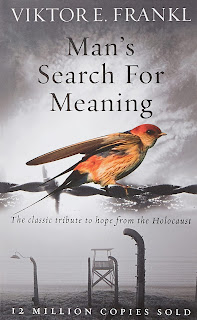Viktor Frankl (2008),
Man’s search for meaning, Rider, London, pp. 154
I read this classic book and ended the last year on a
thoughtful note. As December sets in, something tugs me to ponder over the year
gone by and my reading list reflects the search for meaning and purpose and a
propensity for introspection and reflection. I had saved up this book for the
last and as the winter gently rolled in, I was with this exceptional individual,
who when faced with unspeakable experiences of adversity, oriented himself
towards life and humanity. As I read through Viktor Frankl’s notes from concentration
camps during the second world war, there were two people narrating the story. The
first was the professor of neurology and psychiatry who spoke with lucid objectivity
and dispassionate clarity on what made the survivors last in the midst of
horror and incertitude. The second was the individual who reminisced about the
life he lost and thought about the life that awaited him with hope and longing.
The extraordinary scholar and the ordinary person and the contradiction of the
nature and tone of the arguments are some of the things that makes this work a
compelling read.
The book is divided into three parts – the experiences
at the concentration camp, the introduction to a school of psychotherapy based
on these experiences and a post script. The first part reads like a memoir, the
second an exposition, and third a thoughtful reflection that asks a few
questions.
We live at a time when history is actively being
forgotten or misconstrued and the assault on truth and memory is gaining
traction as this The New York Times review of books Erasing
the Holocaust trenchantly argues. It
is important to lean on memoirs and other forms of historical records to remind
ourselves what we have been through and educate ourselves about the
consequences of erasure. Beyond the inspiring cadence of the triumph of the
human spirit, that is what this book serves to remind us.

